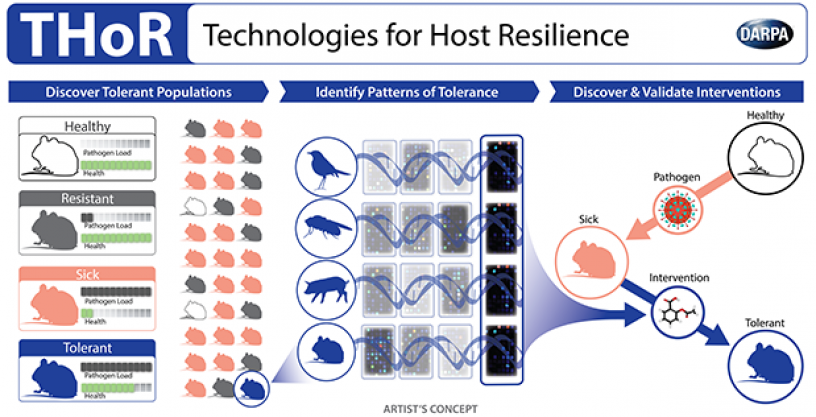
New program seeks to catalyze breakthrough medical treatments by determining why some get less sick than others when infected by the same pathogens
Mar 31, 2015
In every population that encounters an infectious organism, a few individuals prove to be resilient—unfazed by that pathogen because they are either resistant to it (their immune systems keep the pathogen from multiplying to dangerous levels) or tolerant (they don’t get as sick as they otherwise might despite carrying high pathogen loads). Conventional disease treatments such as antibiotics have almost exclusively sought to emulate natural resistance by keeping patients’ pathogen levels as low as possible. This approach has been incredibly successful but has an increasingly serious downside: Any pathogens that survive a particular treatment can defy it from then on, giving rise to new antibiotic-resistant strains. The rising prevalence of multi-drug-resistant pathogens, as well as emerging biological threats, makes developing new medical countermeasures a national security priority.
DARPA’s new Technologies for Host Resilience (THoR) program aims to tackle these issues from a completely different angle. Instead of focusing on how to kill specific pathogens, THoR seeks to catalyze the development of breakthrough interventions that would increase the ability of patients’ own bodies to tolerate a broad range of pathogens. The program will explore the fundamental biology of host tolerance in animal populations with the goal of expanding treatment options for humans in the future.
“Our aim with THoR is to lay the foundation for new treatments that would enable the body to more easily and safely cope with infection,” said Col. Matt Hepburn, DARPA program manager. “Among other potential advantages, these new treatments would prevent the body’s overreaction to infection and buy time for the individual’s natural recovery mechanisms to kick in. We want to help patients ‘weather the storm’ during the critical phases of acute illness.”
If THoR is successful, it could provide substantial benefits to warfighter health and military readiness. New treatments would help reduce reliance on antibiotics and complement ongoing efforts both to fight microbes themselves and slow the emergence of antibiotic resistance—problems the White House aims to address in a new initiative announced last week.
THoR could also help treat life-threatening infections and related illnesses, such as sepsis. A catastrophic overreaction by the immune system to large-scale infection, sepsis afflicts 18 million people a year worldwide and kills between 30 and 50 percent of them. Sepsis poses a significant threat to warfighters who suffer combat injuries that predispose them to infection.
To familiarize potential participants with the technical objectives of THoR, DARPA has scheduled a Proposers Day on Monday, April 27, 2015 in Denver, Colo. Advanced registration is required and is available at https://www.signup4.net/Public/ap.aspx?OID=130&EID=THOR15E. Registration is open and closes Wednesday, April 22, 2015, at 12:00 PM Eastern or when capacity is reached, whichever comes first. Due to space limitations of the conference facility, attendance will be limited to no more than two representatives per organization.
The DARPA Broad Agency Announcement (BAA) announcing the Proposers Day and describing the specific capabilities sought is available at http://go.usa.gov/3YV4h. For more information, please email DARPA-BAA-15-21@darpa.mil.
THoR plans to explore three key technical areas:
- Discover Tolerant Populations: Perform animal studies to examine intra- and inter-species differences in host fitness; identify sub-populations and species that are tolerant to infection
- Identify Biological Mechanisms of Tolerance: Define and characterize the basis for tolerance across multiple biological scales, e.g., species, tissues and cells
- Identify and Validate Pro-Tolerance Interventions: Recreate tolerance mechanisms in susceptible animal populations
Proposers are encouraged to examine novel mechanisms of tolerance, which may extend beyond individuals’ immune systems. To maximize the pool of innovative proposal concepts, DARPA strongly encourages participation in these events and subsequent solicitations by non-traditional performers, including small businesses, academic and research institutions and first-time government contractors.
# # #
Associated images posted on www.darpa.mil and video posted at www.youtube.com/darpatv may be reused according to the terms of the DARPA Usage Policy, available here: http://go.usa.gov/nYr.
Tweet @darpa
